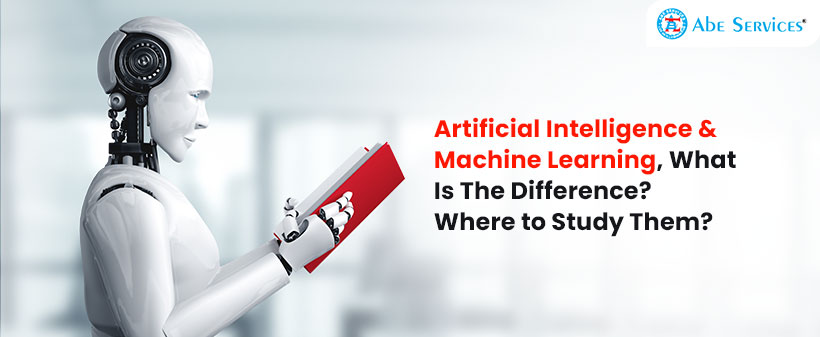
Artificial Intelligence and Machine Learning, what is the difference? Where to study them?
As we entered the 21st century, we started using digital gadgets more and more to the point where they became extensions of ourselves. Be it a personal computer or a phone or something smart connected to your home automation network, they all seem to be making use of something called Artificial Intelligence or Machine Learning. Phone cameras use AI to process images that are dimly light or blurry. Gadgets and software platforms offer personalized digital assistants that adapt based upon your requirements and needs. These days AI, Machine learning, and algorithms make up more keywords related to technology than anything else.
Developments in the area of Artificial Intelligence have started as early as the 1950s. Researchers tried to emulate organic intelligence using their electronic counterparts. Early attempts at creating a system intelligent – so that it may function without any or little human intervention were not, unfortunately, very successful. However, it started a revolution that shaped our lives as of today.
Terms such as Artificial Intelligence (AI) and Machine Learning (ML) are often used interchangeably as some of the use cases are similar. But it is essential to have a clear perspective into understanding the distinction between both of these often confusing terms, especially if you are looking for a career option in either of them.
AI and ML, what are they? How do they differ?
Artificial Intelligence is an umbrella term that describes a man-made system that is intelligent enough to interact with its surroundings, in most cases with humans, and learns from them and also learns from its own mistakes.
AI can be classified into three based on its purpose.
1. Weak AI
These are designed to do a specific function. And these types of AIs will be good at doing that particular function. A well-known example is the chess-playing AI known as ‘Deep Blue.’
2. General AI
General AIs behave and act like humans, imitating emotions and such. Popular examples are AI assistants such as Google Assistant, Siri, or Cortana.
3. Strong AI
At this moment, strong AIs are purely fictional. These could theoretically outperform and outmanoeuvre humans in any given task. These kinds of AIs are portrayed as supervillains in Sci-Fi movies and books.
Machine Learning is a subset of AI used to enhance specific functions such as recommendations in your favourite streaming service or search engines. Machine learning can only act upon the data it is being fed.
Machine Learning is classified into three based on its learning mechanisms and they are supervised learning, unsupervised learning, and reinforced learning.
In supervised learning, the system is fed sample data, and the results are appraised. If the results are on par with the requirements, it is then provided with the actual data. For optimum results, the data that is fed into the algorithm has to be accurate.
Unsupervised learning is done with little human intervention. However, the results may require supervision after the same has been generated.
Reinforcement learning works on a reward-based system. The agent here, being the AI, performs a task on the environment, and the interpreter discerns the outcome and feeds back both a reward for the task and the state of the system. This process ensures a maximized reward for an optimal solution.
Applications and career opportunities
AI is used in a plethora of ways in the modern-day and age. They are used in natural language processing; for example, for Google Assistant to understand something, it has first to identify the language being communicated to it into corresponding digital data, then provide an adept response to the query based on past experiences and training. If a photograph or scanned image of written text is provided to it, it has to use Optical Character Recognition (OCR) to interpret the image data into text. AI can be used to analyze past trends in the stock market and predict the future. Similarly, it can also be used in forecasting weather.
It is said that AI creates more job opportunities than it takes away, as it is evident from previous examples that there has to be a certain level of human intervention needed to ensure the quality of output data. If you are an individual with a strong background in Computer Science, Mathematics, Statistics, or Data Science, these areas might offer you an opportunity for higher education. These areas being niche offers a maximum headspace for career development along with substantial monetary benefits. Big internet companies such as Google, Amazon and Facebook are always in need of experts trained in AI and Machine Learning. Some prospective career options where AI and Machine learning play important roles are,
1. Data Scientist
Data scientists are involved with organizing and making sense out of large data sets. They already make use of AI and Machine Learning tools, and it is an ever-growing field. Data Science is not only beneficial from a research perspective as Multinational companies have enormous data wings and alliances with big data companies where they deal with an influx of data they gather from their users. This data is usually so big that it is impossible to manage with conventional tools. But AI and ML make this a walk in the park.
2. Machine Learning Engineer
A Machine Learning Engineer works on algorithms and tools that make the AI intelligent, like a car that drives itself or enhanced suggestions tailored for a specific user. As a Machine Learning Engineer, your responsibilities involve understanding and using computer science fundamentals along with mathematical skills to design new algorithms and improving operating systems in projects. This position comes with attractive salary packages that average $79,350, depending on your qualifications and past experiences.
3. Research Scientist
A research scientist who works in AI and Machine Learning will be involved with natural language processing, deep learning, and reinforced learning, along with developing neural networks. As a Researcher, your income will not be limited to the hefty paychecks your position might offer but also the patents and Intellectual property rights you may obtain from your research.
4. Natural Language Processing
Natural language processing is an ever-growing field that requires not only experts from computer science but also linguists. This field makes use of technology as well as the knowledge of natural languages.
5.User Experience (UX)
As we discussed earlier, most of the apps and services use a user experience driven by machine learning that adapts based on the use. Although this used to exist outside the domain of AI, recent developments in UX are driving AI experts into this area.
Suppose you are intrigued by the lucrative positions and salary packages offered by AI and Machine learning. In that case, You might ask, “Where can I pursue a course in AI or Machine learning?” Luckily we got you there. Various Universities and institutes around the globe offer a multitude of courses in AI and Machine Learning. Here are some of them for your reference.
Australia:
- Deakin University: Bachelor of Artificial Intelligence
- Western Sydney University: Bachelor of Computer Science (Artificial Intelligence Major)
- University of Wollongong: Bachelor of Computer Science (Artificial Intelligence Major)
- University of Adelaide: Master of Machine Learning
- LaTrobe University: Master of Artificial Intelligence
- Deakin University: Master of Applied Artificial Intelligence
United Kingdom:
- Queen Mary University of London: MSc Artificial Intelligence
- MSc Artificial Intelligence & applications: University of Strathclyde
- MSc Artificial Intelligence: University of West London
- MSc Artificial Intelligence & Big Dada: Anglia Ruskin University
- BSc Artificial Intelligence: Anglia Ruskin University
Canada:
- Georgian College : Artificial Intelligence – Architecture, Design & Implementation (Graduate Certificate)
- Fleming College – Artificial Intelligence & Virtual Reality (Graduate Certificate)
- Durham College – Bachelor of Artificial Intelligence
- Centennial College – Software Engineering Technology (Advanced Diploma)
Ireland:
- Dublin City University: MSc in Computing (Artificial Intelligence Major)
- Trinity College Dublin – MSc Computer Science (Intelligent Systems)
- Technological University Dublin – Bachelor of Science (Computing with Artificial Intelligence & Machine Learning)
Tech companies also offer many courses in these fields if you’re looking to expand your career to the glorious areas of AI and machine learning.
popular posts
categories
facebook feeds



